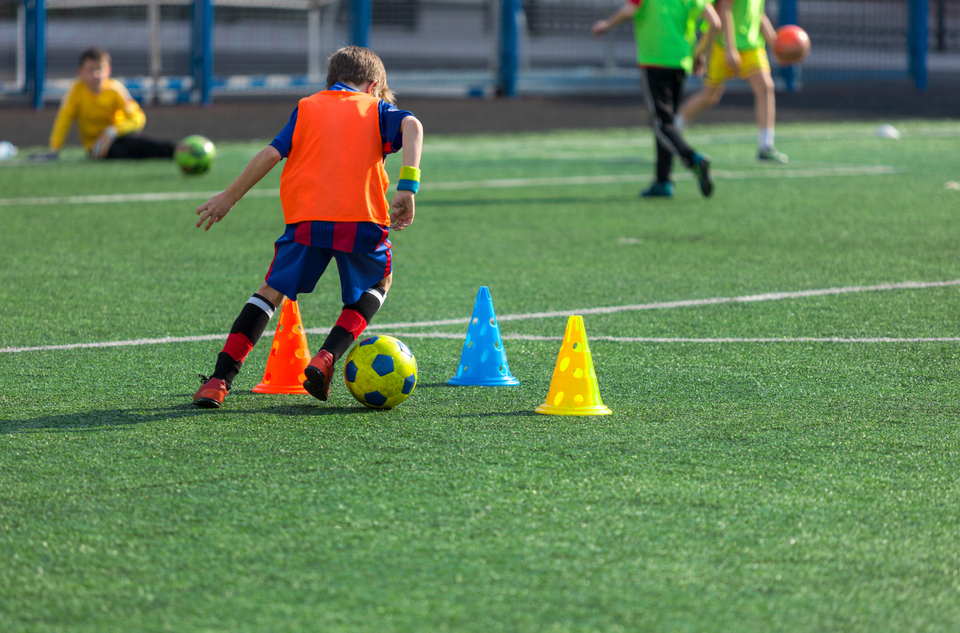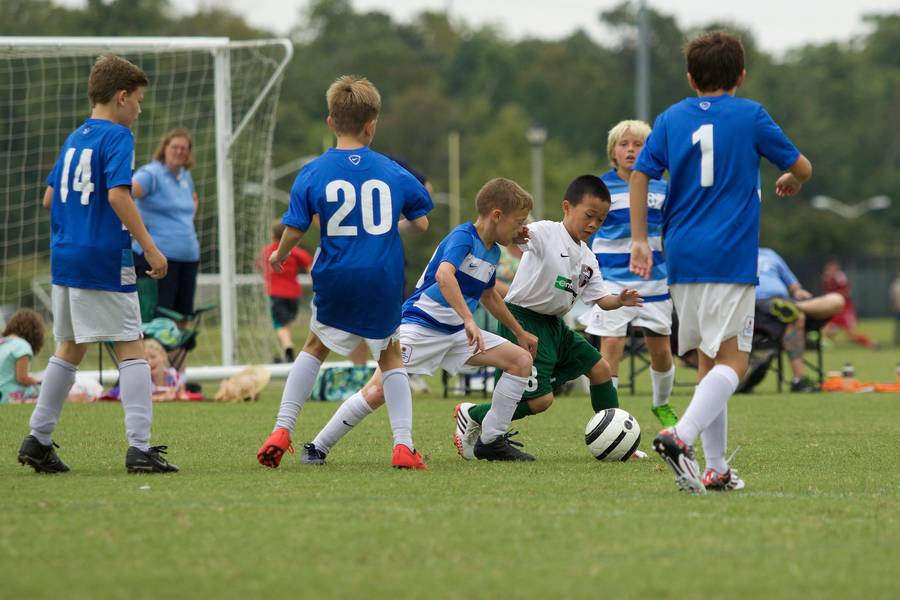Academy players are young footballers who have been scouted and signed by professional football clubs to receive elite training and development. They are part of a structured system that aims to produce the next generation of professional footballers.
However, many parents and grassroots coaches wonder if academy players are allowed to play grassroots football.
According to the Premier League's pre-Academy regulations, academy players are generally not permitted to play grassroots football. However, there are some exceptions.
The regulations state that approval "will be given on an annual basis by each club to determine whether their registered Foundation Phase Academy Players are permitted to play grassroots football. This will be subject to player-by-player circumstances and individual development plans."
Therefore, it ultimately depends on the club's decision and the player's individual circumstances.
Despite the general restrictions, there are some benefits to allowing academy players to play grassroots football.
For example, grassroots matches can provide academy players with the opportunity to play against different styles of play and experience different game situations. It can also help them develop their social skills and build relationships with players and coaches outside of the academy system.
However, it is important to note that playing too much grassroots football can also increase the risk of injury and fatigue, which could negatively impact the player's development.
Understanding Academy and Grassroots Football
Differences Between Academy and Grassroots Football
Academy football is a structured and professional system designed to develop young players into professional footballers. It is a highly competitive environment that provides young players with the opportunity to train and play at a high level.
The academy system is designed to provide a clear pathway for young players to progress through the ranks and eventually make it to the first team.
Grassroots football, on the other hand, is a more informal and recreational form of football. It is played at a local level and is open to players of all ages and abilities.
Grassroots football is not focused on developing professional players but rather on providing an opportunity for people to enjoy the game and improve their skills.
The Academy System and Its Goals
The academy system is designed to identify and develop young talent. It is focused on providing young players with the best possible coaching and facilities to help them reach their full potential.
The academy system is divided into different levels, with category 1 being the highest level.
The goals of the academy system are to:
- Develop young players into professional footballers
- Provide a clear pathway for young players to progress through the ranks
- Provide young players with the best possible coaching and facilities
- Identify and nurture young talent
The foundation phase is a key part of the academy system. It is designed to provide young players with the fundamental skills they need to succeed in football.
Development centres are also an important part of the academy system. They provide young players with additional training and coaching to help them improve their skills.
Eligibility and Regulations for Academy Players
Rules and Regulations Governing Player Participation
Academy players are young footballers who have been scouted and signed by professional clubs to train and develop their skills. These players are subject to specific rules and regulations governing their participation in football matches, including grassroots football.
According to the Football Association of Wales, registered academy players are not permitted to play grassroots football. This means that participation in grassroots matches will not count towards game time requirements set out in the youth development rules.
However, it is up to individual clubs to decide whether or not their academy players can participate in grassroots football on a different day to the academy football.
The Premier League has recently launched pre-academy regulations aimed at "clearly distinguishing" these ages from the official academy system that starts at Under-9s.
The new regulations include limits on contact time and time-distance rules, although these have not yet been specified.
Registration Process for Academy Players
To become an academy player, young footballers must first be scouted and signed by a professional club. The registration process for academy players is subject to approval by the football association, which ensures that the club adheres to the rules and regulations governing player participation.
Once registered, academy players are subject to ongoing monitoring and evaluation by the club's coaching staff to ensure that they are meeting the required standards of skill and behaviour.
This includes regular assessments of their physical fitness, technical ability, and tactical awareness, as well as their academic progress.
Player Development and Opportunities
Balancing Training and Education
For young talents aspiring to become professional footballers, the balance between training and education is crucial.
The Elite Player Performance Plan (EPPP) in the UK requires all academies to provide a minimum of 12 hours of education per week to their players. This ensures that young players receive a well-rounded education while also honing their football skills.
However, some academies allow their players to participate in grassroots football up to the U15 age group.
Hereford FC Academy, for example, permits U13 and U14 players to play grassroots football. This provides an opportunity for players to showcase their skills outside of the academy setting and to continue developing their game in a different environment.
Pathways to Professional Football
While grassroots football can provide valuable opportunities for player development, the ultimate goal for many academy players is to become professional footballers.
As such, academies must provide clear pathways for their players to progress towards this goal.
The FA Guide to Grassroots Youth Football emphasizes the importance of player development over winning at all costs.
This means providing opportunities for players to learn from their mistakes, experiment with different positions, and take on new challenges.
It also means creating an environment where players can play with freedom and enjoyment.
Academies must also provide coaching and training that is tailored to the individual needs of each player.
This involves identifying the strengths and weaknesses of each player and working with them to develop their skills.
Impact on Local Clubs and Communities
Football academies are often seen as a way to develop the best local players and help them reach their full potential.
However, the question of whether academy players can play grassroots football is often asked. In this section, we will look at the impact that academy players can have on local clubs and communities.
Supporting Local Talent and Grassroots Teams
Academy players can have a significant impact on local clubs and grassroots teams.
They bring with them a level of skill, experience and knowledge that can help to improve the standard of play and raise the level of competition.
This can benefit not only the academy players themselves but also the local players who get to play alongside them and learn from them.
In addition to improving the standard of play, academy players can also help to raise the profile of local clubs and grassroots teams.
This can attract more fans and supporters, which can help to generate more revenue and support for the club. It can also help to create a sense of pride and community spirit, as local people come together to support their team.
Community Engagement and Club Relationships
Academy players can also help to build stronger relationships between local clubs and their communities.
By getting involved in local events and activities, they can help to raise awareness of the club and its activities.
This can help to build a sense of community and belonging, as local people come together to support their local team.
Furthermore, by supporting local talent and grassroots teams, academy players can help to create a sense of unity and shared purpose within the community.
Frequently Asked Questions
Are academy players eligible to participate in grassroots football matches?
Yes, academy players are eligible to participate in grassroots football matches. However, there are certain regulations that govern their participation, and it is important for them to adhere to these rules.
What are the implications for a young player being released from a football academy?
If a young player is released from a football academy, they may be able to continue playing football at a grassroots level. However, they may need to adjust to a different level of play and may need to work harder to achieve their goals.
What regulations govern the participation of academy players in school football teams?
The Football Association Youth Development Rules govern the participation of academy players in school football teams. These rules are designed to ensure that young players are given the best possible chance to develop their skills and reach their full potential.
At what age can a child be enrolled in a pre-academy football programme?
There is no set age at which a child can be enrolled in a pre-academy football programme. However, many programmes accept children as young as five or six years old.
How do FA Youth Development Rules impact academy players' participation in external tournaments?
The FA Youth Development Rules may impact academy players' participation in external tournaments. These rules are designed to ensure that young players are not overworked or overplayed, and that they are given the best possible chance to develop their skills and reach their full potential.
What is the process for a young player to attend football pre-academy trials?
The process for a young player to attend football pre-academy trials varies depending on the specific academy.
However, most academies require players to attend a trial or assessment session. At this session, their skills and abilities will be evaluated by academy coaches.


















